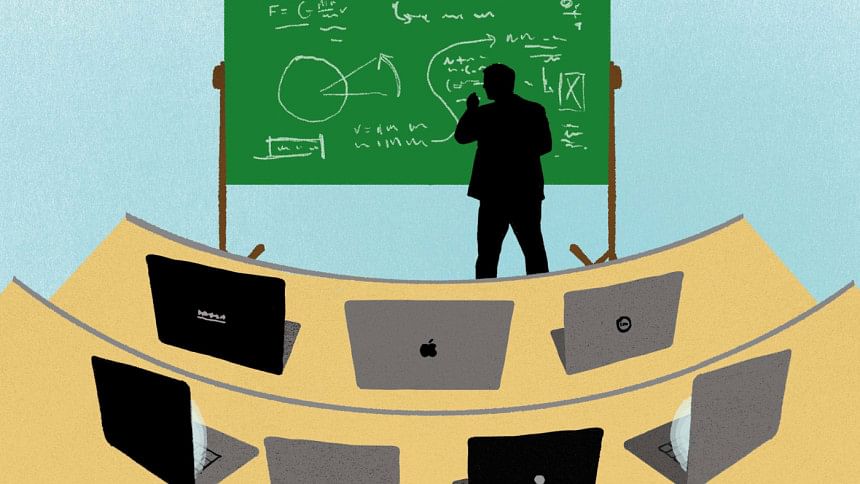Teach me, Sensei!

The Academic Experience Project is a faculty-student collaborative work aimed to glean insights about the experiences of tertiary-level students. Each Friday, The Daily Star publishes an op-ed highlighting its findings. This is the eighth article of the series.
Higher education in Bangladesh has become much more accessible than in the past. Within a short frame of time, the number of listed private universities has gone up dramatically to over 103. The number of public universities has also increased from six at the time of independence to 53 at present (Wikipedia). This reflects a favourable scenario in terms of access to higher education. However, the question of quality over quantity has been of concern for decades.
We take a deep look into one of the core contributors to the quality of higher education—the faculty: the people who create and disseminate knowledge. They are recruited to fulfil the expectations and satisfaction levels of the students pursuing higher education. We explored whether and the extent to which the faculty are meeting expectations.
Student satisfaction with their teachers—often neglected, sometimes disregarded and even derided—can be a surrogate measure of overall quality of education. If the learning that teachers inspire is fulfilling, students should be satisfied. Of course, it is not the only criterion by which the quality of education should be judged, but it is definitely an important element. Since studies that connect faculty qualities with student satisfaction are not common in Bangladesh, The Academic Experience Project provided an opportunity to investigate this link.
The study explored students' level of satisfaction with the knowledge gained, in-class performance, and behaviour of the faculty of their respective universities. The survey asked questions such as whether the faculty are friendly and helpful, whether their treatment of the students is fair, and whether they were knowledgeable and competent in their respective fields. Importantly, we wanted to know if they inspire the students to achieve excellence in both academic and professional life.
Broadly, our findings indicate that students from public and private universities responded differently about their teachers. While the academic qualifications of most faculty members in the universities are generally impressive, many of them, especially those from public universities, do not possess good communication or delivery skills. To the students, this quality matters hugely, and is seen as no less important than the academic qualifications of the teachers.
We contend that not every top-notch graduating student is a top-notch teacher and appointing them exclusively on the basis of academic results can be problematic, especially when top-notch results are often based on rote learning and much less on problem-solving and related skills. When a teacher's communication capabilities or overall interpersonal skills are not up to the mark, their ability to teach is invariably diminished. The more a teacher is communicative, interesting, inspiring and approachable, the more effective he or she is likely to be in transferring knowledge.
In this regard, several comments received from surveyed students are worthy of examination. One of them said: "I feel like there should be a type of authority who can check what the course instructors are doing. Some of them are absolutely brilliant and loveable, while some of them do things as they please." Another said: "My institution is good but not enough. Mainly our teachers, not all of them, but most of them. Sometimes I think they are not qualified to teach me (in some cases)." Another student commented, "[Learning] is quite by the book while it would be better if most of the academic teachings were taught with real examples."
Differences were also observed in the perceived friendliness and fairness of the faculty in public and private universities. Public university students evaluated their faculty more harshly than their private university counterparts. They also rated their teachers as less inspiring than did the students from private universities. Private university students also found the classes conducted by their teachers more enjoyable. Interestingly, all the students who expressed their intentions to leave their current institutions if they could—irrespective of public and private institutions—graded the faculty lower in their evaluations, suggesting that faculty members play a key role in their decision to quit.
Teachers are generally appointed on the basis of their academic excellence and educational qualifications. This is logical and appropriate. Consequently, they ought to be the smartest person in the classroom. It is also important for the teachers to project themselves as good role models, especially in terms of timeliness and regularity of classes.
There is an age-old debate as to whether the students in universities are customers of education, or mere products. There is no definitive answer to this question. However, an alternate view is that "students are neither customers nor products; they are co-creators of knowledge." This view resonates with many students, a perspective that completely redefines what a classroom ought to be. And because, ideally, teaching is a process of knowledge co-creation, the role of the faculty member is to make the process effective, enjoyable and inspiring.
Evaluating faculty members both before and after their appointment in the universities and providing them with training and guidance, based on the results of these evaluations, must be firmly rooted in the academic space. Importantly, the evaluations provided by students must be treated with utmost seriousness, not given mere lip service.
Many faculty members understand the value of such feedback; however, there are those who scorn students who take teaching evaluations seriously and provide meaningful inputs. One student related an experience where he was told, "I teach at a public university; your evaluations will have no effect on my employment status and future prospects." This type of mind-set must change to instil excellence in an institution. Policies of the universities must firmly deal with behaviours unbecoming of university faculty.
Here's hoping that more faculty members of our higher educational institutions will aspire to be truly inspiring, with a nurturing spirit towards their students. Only then will quality education be delivered in its truest sense.
(Sensei, which roughly translates to "Master", is a respectful term shared in traditional Chinese, Korean, and Japanese. It is used by a student apprentice to address their teacher, especially in martial art. "Teach me, Sensei!" is a pop culture reference where a student begs a master to take him/her as an apprentice.)
Masum Alvi Chowdhury is working on his MBA degree at IBA, University of Dhaka. Syed Saad Andaleeb is Distinguished Professor Emeritus, Pennsylvania State University, and former Vice-Chancellor, BRAC University. For more information on The Academic Experience Project, contact Dr. Andaleeb at [email protected].

 For all latest news, follow The Daily Star's Google News channel.
For all latest news, follow The Daily Star's Google News channel. 



Comments